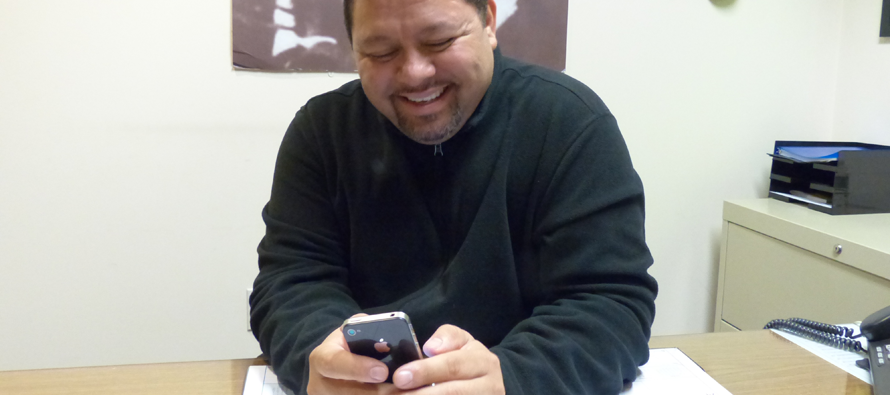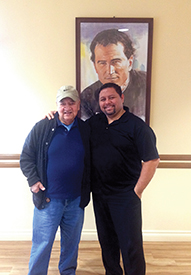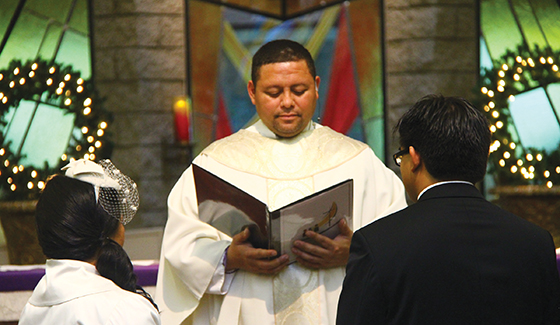The smiling priest

Image: Father José Lucero, S.D.B. keeps up by smartphone with the many young people he ministers to.
LIKE THE YOUNG PEOPLE he serves, Salesian Father José Lucero, S.D.B. is often on his smart phone, sending encouraging words to his closest friends on social media sites. Nicknamed “the smiling priest,” he said God gave him an abundance of love to share—and he shares it with good humor in both the “real” world and the virtual world of cyberspace.
Lucero was drawn to the priesthood as a child of 7, playacting the part for his 12 siblings while they were growing up in the small town of Torreon near Albuquerque, New Mexico. When he was older, he became a leader in the parish youth group, following in the footsteps of his older brothers and sisters.
Attending public high school, the gregarious, guitar-playing teen was socially active, dating girls and having fun with friends. After graduation he worked for a year as a busboy and waiter in the hotel restaurant and later was employed at a senior citizens’ home where he provided entertainment as a singing guitarist and storyteller.
Life was full. He even fantasized about marrying his girlfriend and becoming a father to 10 children. But the childhood tug on his heart to become a different kind of “father” pulled him into his pastor’s office, where he shared his desire to be a priest who ministers to youth. He remembers saying something like: “I want to be a priest who helps young people discover that church is not dull; it’s not boring; it can be fun; it can be interactive; it can be very family-oriented.”
“That’s what the Salesians do,” said the pastor to the teen, who was unfamiliar with the congregation, as the nearest Salesian community was located in Southern California. After getting in touch with the Salesian vocation director, he was intrigued by the way they worked with young people, their style of welcoming ministry. “People who work with kids have to understand the youth culture,” said Lucero. “I just saw how they were so real and joyful. Combined with the religious community aspect, it all attracted me.”
Immersion in ministry
He was also drawn to the Salesian youth center “oratory” setting, which reflects an environment designed to foster a home that welcomes, a school that educates, a playground that nurtures friendship, and a church that helps young people find meaning in their lives. “I liked the idea of the oratory model, finding young people where they’re at and helping them come to a new reality of Christ and their faith,” explained the priest. He decided to join the Salesians at age 19.
“Going through formation was exciting; I was involved in ministry throughout” the 12-year process, said Lucero. He taught parish confirmation classes; he worked at a Boys and Girls Club; he did prison ministry. After taking his first temporary vows as a Salesian brother, he was sent to New Jersey to study philosophy and music.
“It was my first time visiting the East Coast and I loved it—the seasons, the people, the Spanish music,” he said. He continued doing ministry, directing a parish children’s choir and teaching catechism. “It was really awesome and that’s what made part of my stay so nice.”
He later taught religion and music appreciation classes and led the student choir at Don Bosco Technical Institute, a high school in Rosemead, California. After studying theology in Mexico and at the Graduate Theological Union in Berkeley, he was ordained in 2003. His priesthood was progressing apace—until the death of his younger brother in 2006.
Take care of yourself
“After his passing, life got difficult, and I struggled a little,” Lucero said. “Then two years later, my older sister passed away” and he began to doubt if he could continue in his priesthood. He decided to enter grief therapy.
“I went on a sabbatical for a three-month grief program and that was what saved my vocation,” said Lucero. “The therapists were very helpful because the grief process was so difficult and, being a priest involved in ministry every day, you don’t really take time for yourself.” Knowing that a crisis can derail a vocation, he told himself, “ ‘OK, I need help,’ and it was the best thing I could have done for myself.”
He appreciates the daily support he gets from his fellow religious. They communally participate in morning prayer and meditation, often gather for recreation in the afternoons, and have a social/prayer time at least three evenings a week where they share the experiences of their day.
He feels strongly about the need for regular physical exercise. He bikes, swims, runs track, lifts weights, and even does Zumba dancing in his room on his day off. “Being physical is necessary. If we don’t have a physical life in terms of health and wellness, we will not survive as religious. We need to take care of ourselves in order to be able to take care of other people. We cannot give what we do not have,” Lucero said.
A composer of religious music who has recorded and self-produced several albums, Lucero believes that music is enlightening to the soul. “Music is so important to wellness, especially in a Salesian setting, because part of our philosophy is Salesian joy and optimism,” said Lucero. While serving as an associate pastor and after becoming province vocation director for the Salesian Fathers and Brothers, he used his musical gifts and considerable social skills to build up the parish youth ministry program, which continues to thrive to this day.
Adept at using social media—he has 1,500 Facebook friends and also is a regular Snapchat and Instagram user—Lucero thinks technology is essential today in ministry. He posts Facebook messages several times a day, including prayers, jokes, and inspirational sayings. His phone constantly buzzes with incoming texts or phone calls from family, friends, former students, seminarians, and prospective candidates to religious life.
“Being a priest or a religious . . . is actually the beginning of an amazing life, allowing you to bring all your gifts to the table,” he said as he glanced at a recent text on his smartphone. “God has given us all a particular vocation and, well, we just do the best we can to live it, and to be joyful and to find Jesus in the center of everything.”
He remembers facing the reality that he would never have his own children while making a retreat before taking his perpetual vows at age 26. He went through a two-week mourning period. “Once the mourning was over, I was done with that,” said Lucero, who believes each person has a vocation where Jesus can be found in both the joys and trials.
Lucero says he has had many moments of joy in his priesthood and has seen many miracles. Probably the biggest miracle, he recounts, was the transformation of one particular young man who was hurtling down a destructive path. “I thought this kid would be a Columbine kid, and then he turns his life around,” Lucero said. “He told me, ‘My life is what it is because of you. You are the only father figure I have ever had.’ Things like that, those are miracles.”
LIKE THE YOUNG PEOPLE he serves, Salesian Father José Lucero, S.D.B. is often on his smart phone, sending encouraging words to his closest friends on social media sites. Nicknamed “the smiling priest,” he said God gave him an abundance of love to share—and he shares it with good humor in both the “real” world and the virtual world of cyberspace.
Lucero was drawn to the priesthood as a child of 7, playacting the part for his 12 siblings while they were growing up in the small town of Torreon near Albuquerque, New Mexico. When he was older, he became a leader in the parish youth group, following in the footsteps of his older brothers and sisters.
Attending public high school, the gregarious, guitar-playing teen was socially active, dating girls and having fun with friends. After graduation he worked for a year as a busboy and waiter in the hotel restaurant and later was employed at a senior citizens’ home where he provided entertainment as a singing guitarist and storyteller.
Life was full. He even fantasized about marrying his girlfriend and becoming a father to 10 children. But the childhood tug on his heart to become a different kind of “father” pulled him into his pastor’s office, where he shared his desire to be a priest who ministers to youth. He remembers saying something like: “I want to be a priest who helps young people discover that church is not dull; it’s not boring; it can be fun; it can be interactive; it can be very family-oriented.”
“That’s what the Salesians do,” said the pastor to the teen, who was unfamiliar with the congregation, as the nearest Salesian community was located in Southern California. After getting in touch with the Salesian vocation director, he was intrigued by the way they worked with young people, their style of welcoming ministry. “People who work with kids have to understand the youth culture,” said Lucero. “I just saw how they were so real and joyful. Combined with the religious community aspect, it all attracted me.”
| Lucero and Brother Charles Thenier, S.D.B. stand before a portrait of the founder of the Salesians, Saint John Bosco. |
He was also drawn to the Salesian youth center “oratory” setting, which reflects an environment designed to foster a home that welcomes, a school that educates, a playground that nurtures friendship, and a church that helps young people find meaning in their lives. “I liked the idea of the oratory model, finding young people where they’re at and helping them come to a new reality of Christ and their faith,” explained the priest. He decided to join the Salesians at age 19.
“Going through formation was exciting; I was involved in ministry throughout” the 12-year process, said Lucero. He taught parish confirmation classes; he worked at a Boys and Girls Club; he did prison ministry. After taking his first temporary vows as a Salesian brother, he was sent to New Jersey to study philosophy and music.
“It was my first time visiting the East Coast and I loved it—the seasons, the people, the Spanish music,” he said. He continued doing ministry, directing a parish children’s choir and teaching catechism. “It was really awesome and that’s what made part of my stay so nice.”
He later taught religion and music appreciation classes and led the student choir at Don Bosco Technical Institute, a high school in Rosemead, California. After studying theology in Mexico and at the Graduate Theological Union in Berkeley, he was ordained in 2003. His priesthood was progressing apace—until the death of his younger brother in 2006.
Take care of yourself
“After his passing, life got difficult, and I struggled a little,” Lucero said. “Then two years later, my older sister passed away” and he began to doubt if he could continue in his priesthood. He decided to enter grief therapy.
“I went on a sabbatical for a three-month grief program and that was what saved my vocation,” said Lucero. “The therapists were very helpful because the grief process was so difficult and, being a priest involved in ministry every day, you don’t really take time for yourself.” Knowing that a crisis can derail a vocation, he told himself, “ ‘OK, I need help,’ and it was the best thing I could have done for myself.”
He appreciates the daily support he gets from his fellow religious. They communally participate in morning prayer and meditation, often gather for recreation in the afternoons, and have a social/prayer time at least three evenings a week where they share the experiences of their day.
He feels strongly about the need for regular physical exercise. He bikes, swims, runs track, lifts weights, and even does Zumba dancing in his room on his day off. “Being physical is necessary. If we don’t have a physical life in terms of health and wellness, we will not survive as religious. We need to take care of ourselves in order to be able to take care of other people. We cannot give what we do not have,” Lucero said.
A composer of religious music who has recorded and self-produced several albums, Lucero believes that music is enlightening to the soul. “Music is so important to wellness, especially in a Salesian setting, because part of our philosophy is Salesian joy and optimism,” said Lucero. While serving as an associate pastor and after becoming province vocation director for the Salesian Fathers and Brothers, he used his musical gifts and considerable social skills to build up the parish youth ministry program, which continues to thrive to this day.
Adept at using social media—he has 1,500 Facebook friends and also is a regular Snapchat and Instagram user—Lucero thinks technology is essential today in ministry. He posts Facebook messages several times a day, including prayers, jokes, and inspirational sayings. His phone constantly buzzes with incoming texts or phone calls from family, friends, former students, seminarians, and prospective candidates to religious life.
“Being a priest or a religious . . . is actually the beginning of an amazing life, allowing you to bring all your gifts to the table,” he said as he glanced at a recent text on his smartphone. “God has given us all a particular vocation and, well, we just do the best we can to live it, and to be joyful and to find Jesus in the center of everything.”
He remembers facing the reality that he would never have his own children while making a retreat before taking his perpetual vows at age 26. He went through a two-week mourning period. “Once the mourning was over, I was done with that,” said Lucero, who believes each person has a vocation where Jesus can be found in both the joys and trials.
Lucero says he has had many moments of joy in his priesthood and has seen many miracles. Probably the biggest miracle, he recounts, was the transformation of one particular young man who was hurtling down a destructive path. “I thought this kid would be a Columbine kid, and then he turns his life around,” Lucero said. “He told me, ‘My life is what it is because of you. You are the only father figure I have ever had.’ Things like that, those are miracles.”
| Lucero presides at a wedding Mass. |
Tags
Related
- Taking a chance on God: Profile of Father David Gutierrez, C.M.F.
- About-face to the priesthood
- Moved by the power of the Eucharist: Profile of Father Duy Henry Bui Nguyen, S.C.J.
- No regrets: A grateful priest takes stock
- We’re different—in a good way: Profile of Father Roberto Mejia, O.Carm.
- Man with a mission
- Monastic life is habit-forming
- Ministering to migrants in a carport cathedral
- Connections make the man: Profile of Father Kevin Zubel, C.Ss.R.
- A priest (who’s been there) responds to the pain of addiction Read More
Most Viewed
- Find your spirituality type quiz
- Questions and answers about religious vocations
- Celibacy quiz: Could I be a nun? Could I be a brother? Could I be a priest?
- Resources for older discerners or those with physical and developmental differences
- About Vocation Network and VISION Guide




 Paula Doyle is a staff writer for The Tidings, the weekly newspaper for the Archdiocese of Los Angeles. Her articles have also been published by Catholic News Service and the Catholic Legislative Network, an online project of the bishops’ California Catholic Conference.
Paula Doyle is a staff writer for The Tidings, the weekly newspaper for the Archdiocese of Los Angeles. Her articles have also been published by Catholic News Service and the Catholic Legislative Network, an online project of the bishops’ California Catholic Conference.